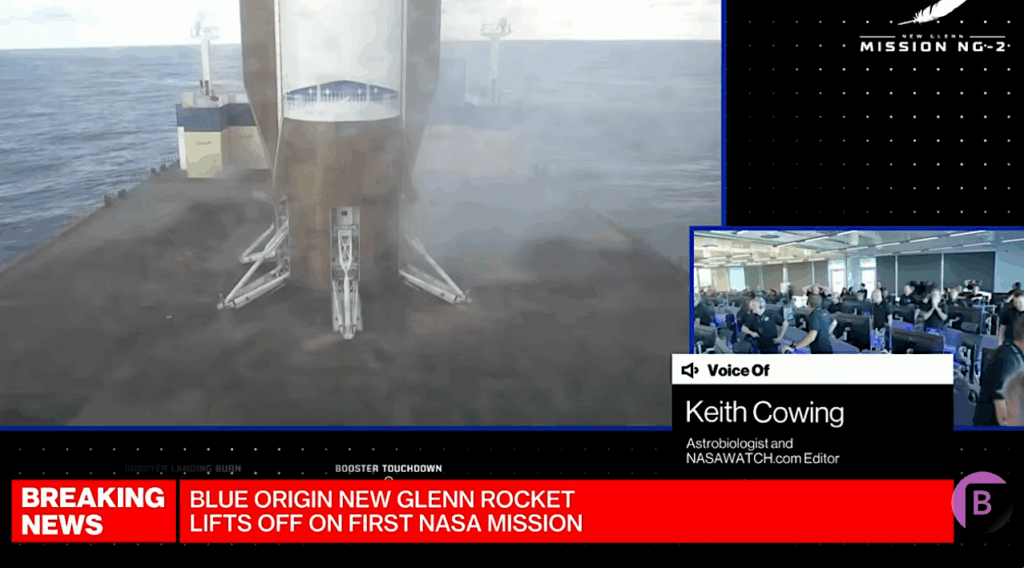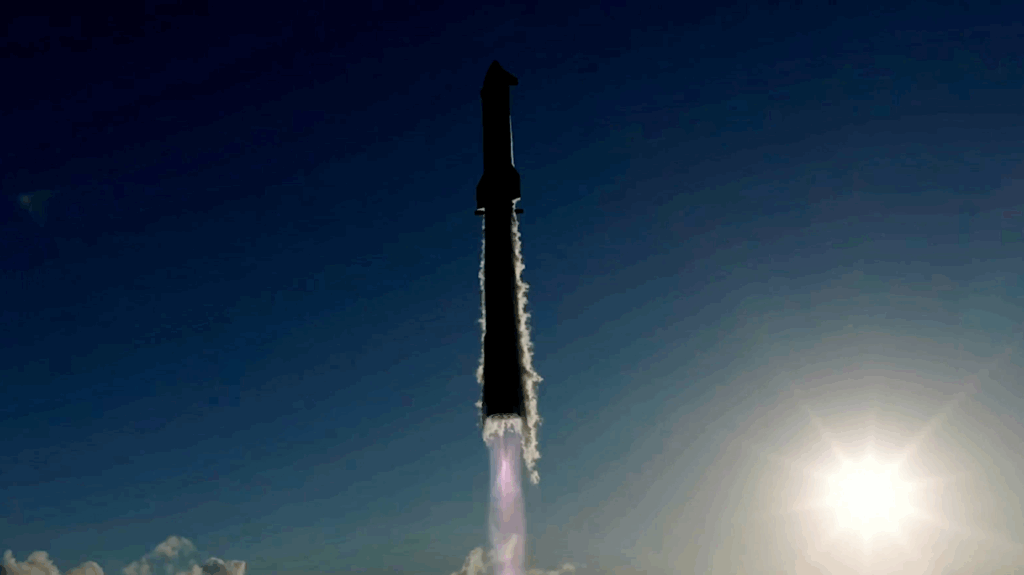Did Republicans Just Endorse The Obama Commercial Space Policy?

Republican Platform
“The public-private partnerships between NASA, the Department of Defense, and commercial companies have given us technological progress that has reduced the cost of accessing space and extended America’s space leadership in the commercial, civil, and national security spheres. The entrepreneurship and innovation culture of the free market is revitalizing the nation’s space capabilities, saving taxpayer money, and advancing technology critical to maintain America’s edge in space and in other fields. To protect our national security interests and foster innovation and competitiveness, we must sustain our preeminence in space by launching more scientific missions, guaranteeing unfettered access, and ensuring that our space-related industries remain a source of scientific leadership and education.”
– Newt Gingrich and Bob Walker Endorse Obama’s New NASA Plan, Urge Bipartisan Support, CSF (2010)
– Is Gingrich’s Pro-Obama Space Policy Stance About to Flip Flop … (2012)
 Keith’s note: Looks like the RNC just endorsed the Obama Administration’s commercial space policy – just like New Gingrich and Bob Walker did. Then again Newt was against it before he was for it (or was it the other way around?). Of course, Mike Griffin was moving in this direction before Obama – and Sean O’Keefe before Griffin. Either way, its deja vu all over again with supporters of commercial space on both sides. Oddly, right now, Republicans in Congress are among the most vocal opponents of the current incarnation of the same commercial space policy that began in a Republican administration.
Keith’s note: Looks like the RNC just endorsed the Obama Administration’s commercial space policy – just like New Gingrich and Bob Walker did. Then again Newt was against it before he was for it (or was it the other way around?). Of course, Mike Griffin was moving in this direction before Obama – and Sean O’Keefe before Griffin. Either way, its deja vu all over again with supporters of commercial space on both sides. Oddly, right now, Republicans in Congress are among the most vocal opponents of the current incarnation of the same commercial space policy that began in a Republican administration.









Shhh! Don’t call it Obama Policy! Call it encouraging Private Space!
There are many of us on the political right who support this. Just because our party’s dinosaurs are SLS zealots doesn’t mean that many more are not. There are a lot of good people who are on the right who supported “commercial” or the public/private partnership in space.
True indeed; and it is worth pointing out that the concept of commercial space is a terrific example of the conservative notion that private business will out-perform governmental enterprise.
I’m just having a bit of fun with those on the right who disdain ANYthing with the name of the current president attached (successful or not). No harm, no foul, I hope.
It just shows that Americans have lost interest in critical thinking, i.e. questioning the logic behind their own political choices rather than accepting or rejecting them based on party affiliation, gut impulse, or in the case of many of our elected officials, a fat check from a lobbyist.
I have tried with limited success to suggest that there is little correlation between an individual’s political party and his/her position or awareness regarding spaceflight. I find it more useful to focus on the issues.
I don’t think of it as the Obama space policy or the whoever space policy. I think of it as the economical space policy. Let’s face the facts. IN a constantly strained budget, you have to do more with less. The new space companies are offering that economical edge. The older space companies aren’t. True the older space companies have a political edge with being established, well known factors to deal with that employ lots of people in key congressional districts, but as the newer companies grow and employ more folks in other districts, that edge disappears. More and more endorsing commercial space, pay per play style contracts just makes sense.. Cost plus style contracting, just costs too much money that the Federal government don’t have. The latest statements are simple acknowledgement of that fact. But don’t expect Senators Shelby or Hatch to go along in any great hurry with this though.
Well…, considering that much of this Obama CSP has several roots in something originally espoused several decades ago, by none other than the Gipper himself, I’d be surprised and even peeved if his own GOP — who supposedly worships the guy — stomps all over it, just because the “Other Side” had affixed their own approval (and name) on it!
Please note that convention platforms are merely stakes in the ground with many players offering input. They are not the same thin as policies pursued on Capital Hill. The latter does, indeed, tend to stomp all over this policy. <insert surprise=”” and=”” peevishness=”” here=””>
Did Obama or Holdren ever actually stated a policy in advance of commercial cargo or crew?
Did anyone at NASA ever state a policy in the first couple of years?
As best I could determine, Elon Musk was the first to say he wanted to build cost efficient passenger carrying rockets and capsules, and then take people to Mars. He had some support from Richard Garriott and others. I remember Garriott saying, shortly after his 2008 Soyuz flight, that he was investing with Musk because he intended to fly in space again.
The NASA attitude was, sure, go ahead, lets see what you can do, fully anticipating Musk would fail early on. Although Musk had a string of early failures, he persisted, and then he showed some success,
Constellation and Orion (MPCV) were not going too well about this time. Remember Orion was supposed to be flying before Shuttle shut down. In fact Augustine said Shuttle should not be shut down until Orion was on-line. I remember in a Congressional briefing, Gerstenmaier said he had to shut down Shuttle because he needed the money to pay for Orion. After Augustine, Obama shut down Constellation in response.
Many of the Constellation people left NASA, including some of the X-38 people who joined forces with Mark Sirangelo on Dream Chaser.
It was only then, simultaneus with Shuttle’s demise and as Constellation was being cancelled, that NASA figured maybe they could make use of these newspace “commercial” vehicles and they started commercial cargo. It wasn’t an Obama plan and it was less a choice by NASA as much as a last resort, the only option NASA could hope for, especially given their own failure to move forward on Orion. Boeing was the last to start up with CST, and they did so because they did not want to be left in the dust by Lockheed and Space-X.
NASA and Boeing were both reactive, not proactive. There has never been an Obama policy beyond reducing money for manned space. Belatedly NASA tried funneling money to commercial cargo and then commercial crew. It was a relative paltry number of dollars and what difference did it make to NASA-NASA was spending billions on Orion with nothing to show for it?
The success of the effort is far more in the hands of Musk and others than in the hands of anyone in NASA. NASA management has shown itself to be a total failure.
NASA/ OKeefe selected depot centric. Oops. Bush appointed Griffin, VSE, ESAS–back to shuttle derived. NASA studies show cheaper alternatives than SLS. Congress allocates 3B/yr for SLS/Orion, so how is this a NASA failure? Ever wonder how many folks were reassigned supporting alternative approaches? Only a few folks with 100Ms have successes, SpaceX was a launch away from possible shutdown until NASA money arrived; more work required than simply declaring its because of the ‘free market +competition’.
The policy, blocked by Congress, has been to shift billions from operations back to science and innovation to step up to the Space Grand challenges, recommended by parts of NASA. Garver: SLS should not be built. HSF and science, can offer a stable demand for LV services in a new renewable, LV independent architecture based on on-orbit fueling. The demand will reduce launch costs–a new national policy to consolidate Atlas/Delta/SLS, shifting $$ to missions/R&D.
In contrast, the 2004 Policy kept NASA from being proactive as everything was kept separate, which resulted in significant launch cost increases and no advancements 500M to 1B+/launch. Falcon launches Class A payload/crew on a common configuration without solids with the goal of resuse.
” Recognizing the schedule burdens placed on unmanned payloads launched using human rated systems, we understand that the DOD and NASA believe that separating human rated space exploration from unmanned payload launch will best achieve reliable and affordable assured access to space while maintaining our industrial base in both liquid and solid propulsion launch systems.”
“1. DOD/NASA will utilize EELV for all payloads 5 to 20 mT
2. NASA will development Crew LV derived from Space Shuttle solid boosters 20 to 30 mT class{no cargo!}
3. NASA and DOD will pursue a cost-benefits analysis on phasing out Delta II in favor of EELV.
4. It is unlikely DOD will endorse the use of NASA developed booster as a backup for EELV due to the significant risk, reliability, and cost modifications potentially required to DoD’s satellites and infrastructure. NASA does not promote the use of NASA-developed booster as a backup for EELV.
5. NASA agrees to use the EELV for science and ISS cargo resupply missions in the 5- to 20-metric-ton class to the maximum extent possible” {not crew!}”
http://www.rand.org/content…
The assumption that NASA is populated at the highest levels by anything other than very smart and well-informed people is a silly arm-chair error. Moreover, those of us sitting in the arm-chairs are privy to neither the Big Picture nor with the responsibility to lead/protect hordes of employees nor with the job responsibility of implementing policy carved perhaps by folks with ulterior motives.
From what I’ve been able to glean from very little data available to me in my arm-chair, the NASA policy makers are fully aware of the SLS folly. Indeed anyone in the space world – another universe populated by smart and informed people – any of those folks not currently gorging themselves at the SLS trough will have the same conclusion: SLS is a porker.
There are lots of arguments about the direction taken with SLS, but the true folly wasn’t really apparent until Mr. Musk found his footing.
“The assumption that NASA is populated at the highest levels by anything other than very smart and well-informed people is a silly arm-chair error.”
I agree with that…but… I have noticed two things that make smart people stupid. One is arrogance. The other is having an agenda that is contrary to common sense and honesty.
Now see that’s where you and I part company, Mr. Sink.
Attributing motivation bothers me. I don’t know that there’s dishonesty, and I also don’t know if you do either; and as to common sense, I suspect that neither of us are fully briefed; the inevitable missing pieces may define solutions that appear contrary to common sense but which are not.
Hi Michael. My point is that all humans are imperfect and subject to irrational emotions and behavior. And a very large number of people have been and will be corrupted by power, and use it to improperly try to control and punish others. To deny this is to deny reality.
I hate to be the bearer of bad news, but ….
Yes Senator Obama put out a seven page space policy, I believe it was written by Scott Gration, The Air Force General, Obama wanted to make the NASA Administrator… I picked lines about directions he wanted and commercialization.
“Since 1981, the Space Shuttle has been NASA’s workhorse. Its retirement will leave NASA without human spaceflight capability until the first elements of the Constellation program are operational, some five years later. This gap between the retirement of the Space Shuttle and the entry into service of its replacement is a serious concern. Barack Obama is committed to making the necessary investments to ensure we close this gap as much as is technically feasible and to minimize reliance on foreign space capabilities”
“Using the Private Sector: Obama will stimulate efforts within the private sector to develop and demonstrate spaceflight capabilities. NASA’s Commercial Orbital Transportation Services is a good model of government/industry collaboration.”
“Barack Obama would ensure that NASA and other federal agencies are fully utilizing the ISS to conduct research that can help address global challenges such as public health and energy independence and can develop technologies that can provide economic benefits to Earth. Obama also will enable research on the ISS to support long-term human exploration and planetary research needs.”
“Partnering to Enhance the Potential of the ISS: Barack Obama will enlist other Federal agencies,industry and academia to develop innovative scientific and technological research projects on the ISS.”
“Enabling Human Exploration: Obama will use the ISS for fundamental biological and physicalresearch to understand the effects of long-term space travel on human health and to test emergingtechnologies to enable such travel.”
“Enhancing the Role of NASA as a Premier Institution of Innovation: Engineers and scientists at NASA have developed state-of-the-art innovations across the technological spectrum in areas ranging from solar cells and imaging to communications and aeronautics. Barack Obama will renew NASA’scommitment to innovation-driving basic research that the private sector can use to develop new products for American consumers.”
“Increasing Commercialization Benefits: Obama will promote cost sharing initiatives between government and industry to increase the state of the art in various technical areas, such as microelectromechanical systems, nanotechnology, and biotechnology. Obama will establish multi-agency programs that focus on rapid maturation of advanced concepts and transfer to industry for commercialization.”
“Jumpstarting Consumer Technology: Obama will expand the use of prizes for revolutionary technical achievements that can benefit society, and funds for joint industry/government rapid-to-the consumer technology advances.”
“Supporting Commercial Access to Space: Obama will stimulate the commercial use of space and private sector utilization of the International Space Station. He will establish new processes and procurement goals to promote the use of government facilities. We must unleash the genius of private enterprise to secure the United States’ leadership in space.”
http://www.obamanauts.org/o…
Sounds like Gration would have made a good Administrator. Five years has now gone by. When is that first Orion launch?
OTOH, looking at stories about Gration’s time since then… maybe not. Smart guy, very bad manager.
“There has never been an Obama policy beyond reducing money for manned space.“
The fact that Obama fought to save the ISS, extend it’s operational life beyond the 2020’s, and fight Congress for the creation and funding of the Commercial Crew program proves your statement to be totally false.
“Belatedly NASA tried funneling money to commercial cargo and then commercial crew.“
“NASA” is not a person, nor does “NASA” create it’s own funding.
The President runs NASA, and the Congress creates funding laws that allow NASA to spend money on the programs that Congress has authorized them to spend money on.
Let’s stick to facts please.
“The success of the effort is far more in the hands of Musk and others than in the hands of anyone in NASA.“
Commercial space companies need a market in order for them to invest in creating space-related products and services. The ISS, which is the largest HSF program NASA has, is a perfect place to use commercial services for supporting government needs.
Supporting government needs is an important way for commercial companies to build up capabilities that can be leveraged by non-government entities. And THAT is required if the commercial space sector is going to be able to be self-sufficient without direct government involvement.
I’m not sure we’re there yet, so what we’re in is a transition period, which all markets go through. We’ll see what happens after the ISS program comes to any end…
Your understanding of the timeline is deeply distorted. Others have pointed out some areas, but I think this part needs to be emphasised:
COTS came about under Griffin. The concept seems to have been created under O’Keefe in response to VSE and the Columbia accident investigation, but the first funding only occurred in 2006 under Griffin.
By 2008 (your Garriott comment), SpaceX had been working under COTS for 2 years. It was the availability of COTS funding that caused SpaceX to skip their Falcon-5 intermediate launcher and go directly to F9/Dragon.
(The original COTS plan included four categories, A through D. COTS-D was commercial crew. Apparently Griffin blocked COTS-D (crew) because it would compete with Ares-I/Orion, but it was reinstated in 2010 alongside the cancellation of Ares-I. However, Republicans in Congress continually underfunded the program until just recently.)
The original announcement by GW Bushon Jan 14, 2004: “In 2010, the Space Shuttle ,, will be retired from service. … Our second goal is to develop and test a new spacecraft, the Crew Exploration Vehicle, by 2008, and to conduct the first manned mission no later than 2014.”
President Bush had _not_ funded COTS-D and made it clear that the Orion was the only alternative for accessing the ISS. At that time the gap in human spaceflight would already have been four years. And that was predicated on “testing” the Orion in 2008, when Bush was still in office! So the program was years behind, and the gap would have been years longer, before the end of the Bush administration.
Michael Griffin became administrator April 13, 2005. Although the Orion capsule alone could have been designed to fly on the Delta Heavy, with its service module it would be too heavy for even the Ares I. The FH was not even an idea at the time. So keeping the gap to only four years was already, in retrospect, impossible.
President Obama initiated Commercial Crew Program and development of the Dragon and Starliner, which will close the gap. He attempted repeatedly to accelerate Commercial Crew and was rebuffed by Congress. Even so the gap will be only slightly linger than President Bush announced in 2004 and much shorter than it would have actually been had we been dependant on the Orion only.
So in retrospect I can see no possible reason for criticizing President Obama for the gap in human launch capability.
It was my understanding that 1 billion was the going to be the set aside for COTS. 500 million for the cargo part with the last 500 million going to kick off part D, Griffin moved that last 500 million to the Ares I program.
Not to mention cutting about a quarter of the science budget and most of the tech development budget to fund Ares/Orion.
And so there’s nothing in the pipeline for the outer solar system.
Under Griffin, they had to cancel JIMO, the Terrestrial Planet Finder, the Space Interferometry Mission. Basically every major mission except JWST and the already funded Mars rovers. Plus cancelled the “Prometheus” research program for a next-generation space nuclear reactor. And the life-science research at Ames was slashed by nearly 80%.
All to make up a $3 billion shortfall in Ares/Orion funding because Griffin thought he was Jim frickin’ Webb and could manipulate Congress into boosting funding for the Apollo-redux, and Congress said, “Ha, amateur” and gave no new funding while legislating a requirement for the new program.
And the program schedule still shifted to the right one year per year.
[Meanwhile, Griffin is held up by Republicans and the Primary contractors as God’s Own Administrator, while Obama is the monster who “killed the space program”. Argh.]
“There has never been an Obama policy beyond reducing money for manned space.”
You should actually read the proposals made by President Obama. This is the speech he made at the Kennedy Space Center on April 15th 2010.
“All that has to change. And with the strategy I’m outlining today, it will. We start by increasing NASA’s budget by $6 billion over the next five years, even — (applause) — I want people to understand the context of this. This is happening even as we have instituted a freeze on discretionary spending and sought to make cuts elsewhere in the budget.
So NASA, from the start, several months ago when I issued my budget, was one of the areas where we didn’t just maintain a freeze but we actually increased funding by $6 billion”
http://www.nasa.gov/news/me…
He wanted a NEW FUNDING INCREASE to fully fund commercial crew. So maybe you should rephrase your statements.
From the NASA website:
“In 2004, President Bush established the U.S. Space Exploration Policy which called for a return to the moon by 2020 and the Space Shuttle to be retired by the end of 2010 after completion of the ISS assembly. Soon after Mike Griffin became the new NASA Administrator in 2005, he challenged U.S. private industry to develop cargo and eventually crew space transportation capabilities that could meet the needs of ISS. The Administrator allocated $500 million over five years to stimulate the development and demonstration of commercial capabilities and fenced the funds. COTS could thus be started quickly and NASA stood by its funding commitment made in the COTS announcement.”
I don’t have a dog in this hunt but it would seem that private space would be consistent with Republican policies encouraging privatization of government functions when feasible.
ETA: No dog other than really enjoying the technical achievements that SpaceX is making with the Falcon landings.
Good points. I’d say that $100,000,000 per year out of an $18,000,000,000/year budget, or .0005% , if I did the calculation correctly, reflects the significance being placed…that way you can say “we supported”
0.56%
Do you think its appropriate to include the costs of all the technology that does not make it to market, given that 90% of all startups fail? For example Kistler or Sealaunch or even Iridium/Globalstar, etc.
By “we” do you mean the taxpayer or NASA or Congress or someone else? Is it true that SpaceX was one launch away from going out of business then received NASA funding?
Without government demand, can current and projected free markets carry the costs of launch services and still offer competitive rates or do you expect them to rise due to lower launch rate? How many companies one, which would eliminate all competition?
Off-topic aside:
Reading the live-event ticker: “First soft landing [of] humans on Mars at 2 pm EDT.”
If you want to read a bit of history and the back story to commercial cargo and crew here is a good summation..
Talk about commercial transportation was taking place at NASA long before “The Vision for Space Exploration” outlined the need for cargo and crew services.
“Christopher C. Kraft, recommended that responsibility for Shuttle operations be delegated to a consolidated prime contractor. In addition to recommending that NASA remove the restriction on commercial payloads, the report also stated, “Increasing industry involvement in the operation of the space shuttle can be viewed as one of the first steps toward the commercialization of spaceflight.”19
By the late 1990s, NASA began a more concerted effort to consider options for future space transportation architectures that would allow “assured access to space”—a matter of growing concern for the space agency—including combinations of Shuttle, ELVs, and privately-owned RLVs. In February 1998, NASA Chief Engineer Daniel R. Mulville spoke about engaging with industry to develop commercially viable RLVs. At the time, RLVs in development included, for example, the fullyreusable Roton envisioned by Gary C. Hudson’s Rotary Rocket Company, Inc.21 Mulville believed these next generation systems would develop cargo capability first, before moving to human-rated systems for astronaut transportation.
However, Mulville stressed that companies would determine the best route for their particular business needs: “This is not something we do by ourselves. This is a partnership opportunity. It’s a way for us to work with industry.” Many of the themes Mulville explored in his remarks would become hallmarks of NASA’s cooperation with industry in future years. These included NASA becoming a customer of low-Earth orbit transportation services (as opposed to owner of the vehicle), thereby allowing the space agency to focus on research and development for exploration farther into space. Another theme that would continue to emerge in discussions of the commercialization of low-Earth orbit was the “significant hurdle” for companies to be able to profitably market their services in the private sector.22
In September 1998, NASA awarded five one-year contracts for the study of a more cost-effective space architecture in order to provide insight Into how the Space Shuttle would be utilized in the future. The five companies, including Boeing and Orbital Sciences Corp., suggested concepts such as launch vehicles, in-space transfer vehicles, the type of infrastructure necessary to support these systems, and priorities for investment. The next month, Congress passed the Commercial Space Act of 1998. The Act encouraged the development of commercial services by requiring the government to “acquire space transportation services from United States commercial providers whenever such services are required in the course of its activities.”23
http://www.nasa.gov/sites/d…
I’m reading all this commentary and thinking how much has changed of our impression or what we remembered when VSE was introduced. Ten more years, much of this will be even vastly different. When all of us become “worm food” how people perceive the decisions of the space program will be unrecognizable. Also gets me thinking what was original intent and perception of when ISS started, Shuttle, Apollo, Columbus’ ships, those large Chinese ships before 1500, etc.
I guess this is result of political/business intertwined decisions on funding and designing of systems including Commercial Crew, far from perfect but that’s reality. I sure like to know those non-elected officials make decisions what are they really thinking. I wonder if they could really speak their mind on the forums if it would be, “yes, I know from the beginning it was not the best choice but that was all we were given so we are trying to make the best of it.”
Actually several officials have said just that. For instance, Gerst for all of his faults has very clearly stated that they are doing SLS under mandate.